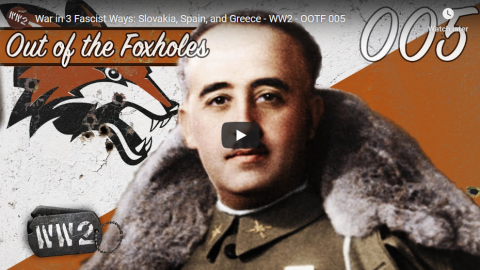World War Two
Published 2 Mar 2023How did the British manage their multinational Merchant Navy who are the non-American operators of Liberty ships? How did Kenyans, South Africans, and others from Britain’s Sub-Saharan empire view the war? And what is going on in Slovakia and Hungary right now? Find out in this episode of Out of the Foxholes.
(more…)
March 3, 2023
African Opinion in the War, Minor Axis Partners, and Foreign Ships in the British Navy – OOTF 30
November 6, 2019
War in 3 Fascist Ways: Slovakia, Spain, and Greece – WW2 – OOTF 005
World War Two
Published 5 Nov 2019What role did Slovakia play during the invasion of Poland? How did Franco view the war in Europe? And did Greece see an invasion coming? We answer all of this in this episode of Out of the Foxholes.
Submit your own question: https://community.timeghost.tv/c/Out-…
Join us on Patreon: https://www.patreon.com/TimeGhostHistory
Or join The TimeGhost Army directly at: https://timeghost.tvFollow WW2 day by day on Instagram @World_war_two_realtime https://www.instagram.com/world_war_t…
Join our Discord Server: https://discord.gg/D6D2aYN.
Between 2 Wars: https://www.youtube.com/playlist?list…
Source list: http://bit.ly/WW2sourcesHosted by: Indy Neidell
Produced and Directed by: Spartacus Olsson and Astrid Deinhard
Executive Producers: Bodo Rittenauer, Astrid Deinhard, Indy Neidell, Spartacus Olsson
Creative Producer: Joram Appel
Post Production Director: Wieke Kapteijns
Research by: Rune Vaever Hartvig
Edited by: Mikołaj Cackowski
Map animations: EastoryColorisations by Norman Stewart and Julius Jääskeläinen https://www.facebook.com/JJcolorization/
Eastory’s channel: https://www.youtube.com/channel/UCEly…
Archive by Screenocean/Reuters https://www.screenocean.com.A TimeGhost chronological documentary produced by OnLion Entertainment GmbH.
September 11, 2014
Would Scottish separation resemble the “Velvet Divorce” of Czechoslovakia?
At the Volokh Conspiracy, Ilya Somin looks at the breakup of Czechoslovakia and compares the possible UK-Scotland divorce in that context:
One relevant precedent is the experience of the “Velvet Divorce” between Slovakia and the Czech Republic, whose success is sometimes cited by Scottish independence advocates as a possible model for their own breakup with Britain. Like many Scottish nationalists, advocates of Slovak independence wanted to break away from their larger, richer, partner, in part so they could pursue more interventionist economic policies. But, with the loss of Czech subsidies, independent Slovakia ended up having to pursue much more free market-oriented policies than before, which led to impressive growth. The Czech Republic, freed from having to pay the subsidies, also pursued relatively free market policies, and both nations are among the great success stories of Eastern Europe.
Like Slovakia, an independent Scotland might adopt more free market policies out of necessity. And the rump UK (like the Czechs before it), might move in the same direction. The secession of Scotland would deprive the more interventionist Labor Party of 41 seats in the House of Commons, while costing the Conservatives only one. The center of gravity of British politics would, at least to some extent, move in a more pro-market direction, just as the Czech Republic’s did relative to those of united Czechoslovakia.
If the breakup of the UK is likely to resemble that of Czechoslovakia, this suggests that free market advocates should welcome it, while social democrats should be opposed. Obviously, other scenarios are possible. For example, famed economist Paul Krugman claims that Scottish independence is likely to result in an economic disaster, because a small country without a currency of its own cannot deal with dangerous macroeconomic crises. I lack the expertise to judge whether Krugman’s prediction is sound. But it does seem like there are obvious counterexamples of small countries that have done well without having their own currencies; Slovakia is a good example. Moreover, although Scottish independence advocates today claim that they will stick to the pound, they could reverse that decision in the future.
All of the above assumes that an independent Scotland will be able to stay in the European Union, and that there would be free trade and freedom of movement between it and the remaining United Kingdom. If the Scots get locked out of the EU or prevented from interacting freely with the UK (perhaps as a result of backlash by angry English public opinion), Scottish independence becomes a lot less viable and a lot more likely to cause serious harm on both sides of the new border.




